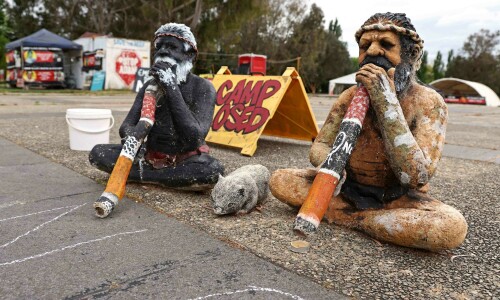CANBERRA: King Charles was accused of “genocide” by an Indigenous senator at Australia’s Parliament House on Monday, moments after he delivered a speech in which he paid his “respects to the traditional owners of the lands”.
Charles, on his 16th official visit to Australia and his first major foreign trip since being diagnosed with cancer, had finished speaking when independent senator and Indigenous activist Lidia Thorpe shouted that she did not accept Charles’ sovereignty over Australia.
“You committed genocide against our people,” she said. “Give us our land back. Give us what you stole from us — our bones, our skulls, our babies, our people. You destroyed our land. Give us a treaty. We want treaty.”
Thorpe, who has disrupted previous events protesting over the colonisation of Australia, was stopped from approaching the king, who spoke quietly to Prime Minister Anthony Albanese on the podium but was otherwise unfazed. Thorpe was then escorted out of the chamber. Thorpe has said the incarceration and violence caused by colonisation can only end with a national treaty between the government and Indigenous people to address First Nations’ issues.
Monarch accused of committing genocide against native people
Former Prime Minister Tony Abbott from the conservative Liberal Party, who attended the event, told reporters it was an “unfortunate political exhibitionism”.
A palace source said the king and queen were grateful to the many thousands of people who had turned out, adding they “are only sorry they didn’t have a chance to stop and talk to every single one. The warmth and scale of the reception was truly awesome”.
The protest was an outlier among a stream of tributes to Charles and Queen Camilla from dignitaries and well-wishers in the crowds, with Albanese speaking about the respect Australians had for their monarch and praising Charles for his long advocacy on climate change. His speech made only a passing reference to the republican cause, which Albanese and much of his centre-left Labor party support.
“The Australia you first knew has grown and evolved in so many ways,” he said. “Yet through these decades of change, our bonds of respect and affection have matured — and endured.”
Published in Dawn, October 22nd, 2024














































Dear visitor, the comments section is undergoing an overhaul and will return soon.